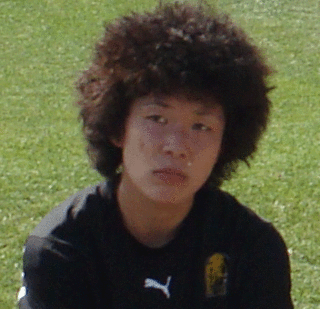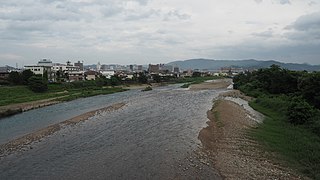
Arakawa is a special ward located in Tokyo Metropolis, Japan. The ward takes its name from the river, the Arakawa, though the Arakawa River does not run through or touch the ward. Its neighbors are the wards of Adachi, Kita, Bunkyo, Taito and Sumida. In English, the ward calls itself Arakawa City.

Adachi is a special ward located in Tokyo Metropolis, Japan. It is located to the north of the heart of Tokyo. The ward consists of two separate areas: a small strip of land between the Sumida River and Arakawa River and a larger area north of the Arakawa River. The ward is bordered by the cities of Kawaguchi, Sōka and Yashio in Saitama and Katsushika, Sumida, Arakawa and Kita in Tokyo. The ward is called Adachi City in English.

Fullmetal Alchemist is a Japanese manga series written and illustrated by Hiromu Arakawa. It was serialized in Square Enix's Monthly Shōnen Ganganshōnen manga anthology magazine between July 2001 and June 2010; the publisher later collected the individual chapters into twenty-seven tankōbon volumes. The steampunk world of Fullmetal Alchemist is primarily styled after the European Industrial Revolution. Set in the early 20th century, in a fictional universe in which alchemy is a widely practiced science, the series follows the journey of two alchemist brothers, Edward and Alphonse Elric, who are searching for the philosopher's stone to restore their bodies after a failed attempt to bring their mother back to life using alchemy.

Shizuka Arakawa is a retired Japanese figure skater. She is the 2006 Olympic champion and the 2004 World champion. Arakawa is the first Japanese skater to win an Olympic gold medal in figure skating and the second Japanese skater to win any Olympic medal in figure skating, after Midori Ito, who won silver in 1992. She is also the second Japanese woman to win a gold medal at the Winter Olympics, following skier Tae Satoya. She was the only Japanese medalist at the 2006 Winter Olympics.

Yorii is a town in Saitama Prefecture, Japan. As of 1 March 2021, the town had an estimated population of 32,851 in 14,689 households and a population density of 510 persons per km². The total area of the town is 64.25 square kilometres (24.81 sq mi).

The Toden Arakawa Line, branded as the Tokyo Sakura Tram, is a hybrid light rail/tram line in Tokyo, Japan, operated by the Tokyo Metropolitan Bureau of Transportation (Toei). The Arakawa Line is the sole survivor of Tokyo's once-extensive Tokyo Toden streetcar system, but it is not the only tram line in Tokyo, as the privately owned Tokyu Setagaya Line is also classified as a streetcar.
Minoru Arakawa is a Japanese businessman best known as the founder and former president of Nintendo of America, and the co-founder of Tetris Online, Inc.
Hiromu Arakawa is a Japanese manga artist. She is best known for the manga series Fullmetal Alchemist (2001–2010), which became a hit both domestically and internationally, and was adapted into two anime television series. She is also known for Silver Spoon (2011–2019) and the manga adaptation of The Heroic Legend of Arslan novels.

The Arakawa River is a 173-kilometre (107 mi) long river that flows through Saitama Prefecture and Tokyo. Its average flow in 2002 was 30m³/s.

Shūsaku Arakawa was a Japanese conceptual artist and architect. He had a personal and artistic partnership with the writer and artist Madeline Gins that spanned more than four decades in which they collaborated on a diverse range of visual mediums, including: painting & printmaking, experimental filmmaking, performance art, and architectural & landscape design.

Bandai-Asahi National Park is a national park in the Tōhoku region, Honshū, Japan. The park site straddles over Fukushima Prefecture, Yamagata Prefecture, and Niigata Prefecture. The park was designated as a national park on September 5, 1950. The park encompasses 186,404 ha of land, consisting of three independent units: the Dewasanzan-asahi Region, Iide Region, and Bandaiazuma-Inawashiro Region.

Eriko Arakawa is a Japanese football player. She plays for Chifure AS Elfen Saitama. She played for Japan national team.

Jōmon Sugi (縄文杉) is a large Cryptomeria tree (yakusugi) located on Yakushima, a UNESCO World Heritage Site, in Japan. It is the oldest and largest among the old-growth cryptomeria trees on the island, and is estimated to be between 2,170 and 7,200 years old. Other estimates of the tree's age include "at least 5,000 years", "more than 6,000 years", and "up to 7,000 years old". The tree's name is a reference to the Jōmon period of Japanese prehistory.

The Arakawa River is a river in Fukushima, Fukushima, Japan.

Mount Kobushi is a mountain on the border of Saitama, Yamanashi, and Nagano prefectures in Japan. The mountain is the source of the Arakawa and Shinano Rivers. It is one of the 100 Famous Japanese Mountains.

Kakkaku dam is a gravity dam located in Saitama prefecture in Japan. The dam was constructed to control flood and to supply drinking water. The catchment area of the dam is 32.1 km2. The dam impounds about 56 ha of land when full and can store 10.25 million cubic meters of water. The construction of the dam was started on 1970 and completed in 2001.

Urayama dam is a roller compacted concrete gravity dam located in Saitama prefecture in Japan. The dam serves for multiple purpose including water-supply for domestic purpose, power generation, and flood control. The catchment area of the dam is 51.6 km2. The dam impounds about 120ha of land when full and can store 58 million cubic meters of water. The construction of the dam was started on 1972 and completed in 1988. The dam is constructed across the Urayama river which is a tributary of Arakawa River.
Arakawa Dam is a concrete gravity dam located in Okinawa prefecture of Japan. The dam is used to collect drinking water for water supply, irrigation and flood control. The catchment area of the dam is 7.4 km2. The dam impounds about 16 ha of land when full and can store 1.65 million cubic meters of water. The construction of the dam started on 1971 and completed in 1976.
Higashi Arakawa Dam is a gravity dam located in Tochigi prefecture in Japan. The dam is used for flood control, irrigation, water supply and power production. The catchment area of the dam is 21 km2. The dam impounds about 37 ha of land when full and can store 6100 thousand cubic meters of water. The construction of the dam was started on 1974 and completed in 1990.
















